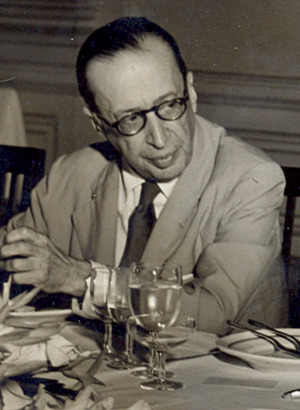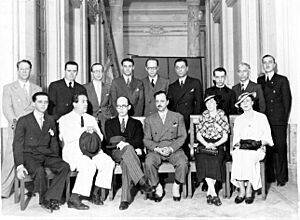Manuel Bandeira facts for kids
Quick facts for kids
Manuel Bandeira
|
|
|---|---|
 |
|
| Born | Manuel Carneiro de Sousa Bandeira Filho April 19, 1886 Recife, Pernambuco, Empire of Brazil |
| Died | October 13, 1968 (aged 82) Rio de Janeiro, Brazil |
| Occupation | Poet |
| Nationality | Brazilian |
| Literary movement | Modernism |
Manuel Carneiro de Sousa Bandeira Filho (born April 19, 1886 – died October 13, 1968) was a famous Brazilian poet. He also worked as a literary critic and translator. Manuel Bandeira wrote more than 20 books of poetry and other writings.
Contents
Life and Career of Manuel Bandeira
Manuel Bandeira was born in Recife, a city in Pernambuco, Brazil. In 1904, he found out he had a serious lung illness called tuberculosis. This made him move from São Paulo to Rio de Janeiro. He hoped Rio's warm, tropical beach weather would help him feel better.
Becoming a Modernist Poet
In 1922, Manuel Bandeira spent a long time in Europe. There, he met many important writers and artists. When he returned, he joined the Modernist Movement in São Paulo. He wrote poems that talked about political and social issues.
By 1924, Bandeira started publishing his most important works. He became a well-respected Brazilian author. He wrote for several newspapers and magazines. He also taught Hispanic Literature in Rio de Janeiro.
Later Years and Translations
Starting in 1956, Bandeira began translating important plays from around the world into Portuguese. He continued this work until his final days. Manuel Bandeira passed away in Rio de Janeiro.
Manuel Bandeira's Poetry Style
Bandeira's poems are known for their special beauty and gentle touch. He often wrote about certain topics in his works. These included his love for women and memories of his childhood in Recife. He also wrote about his friends and his health problems.
His delicate health deeply influenced his poetry. Many of his poems describe the limits and feelings of the human body. Manuel Bandeira is still one of Brazil's most admired poets today.
Simple and Lyrical Writing
Manuel Bandeira had a simple and direct way of writing. However, his style was not as harsh as some other poets. Experts often study his unique rhythm and flow. He was known for being a very lyrical poet. This means his poems often expressed strong emotions and feelings.
His work explored universal themes and everyday concerns. Sometimes, he used a playful approach in his poems. He even used forms and ideas that some people thought were too simple for poetry.
Knowledge of Literature
Bandeira used his vast knowledge of literature to write about daily life. He sometimes used styles from classical and medieval traditions. His first book had very strict poetic forms. It featured rich rhymes and perfect sonnets. In his later works, he used forms like rondos and ballads.
His poetry was not just sad or melancholic. It deeply explored personal struggles. It also showed the artistic challenges faced by poets of his time. His book Cinza das Horas (Ash from the Hours) showed feelings of hurt, sadness, and resentment.
Themes of Joy and Sadness
Another book, Carnaval, came out soon after Cinza das Horas. It began with lively, festive images of carnival. But it ended with feelings of sadness. This mix of joy and pain appeared in many of his poems.
For example, in his poem "Pasargada," he writes about a special place. This place is not real, but a spiritual, peaceful spot. In Bandeira's poems, what he truly desires is often hidden. He used the Portuguese idea of "saudade," which is a deep longing. "Pasargada" and other poems show a nostalgic memory of his childhood. They also describe the street life and daily world of Brazilian cities in the early 1900s.
Manuel Bandeira often wrote about feelings of guilt in his poems. He explored the tension between ideal friendships and physical desires. For him, pleasure was not just about getting what you wanted. Sometimes, the excitement of loss itself brought satisfaction.
Example Poem: Consoada
Here is an example of one of Manuel Bandeira's poems:
CONSOADA
Quando a Indesejada das gentes chegar (Não sei se dura ou caroável), Talvez eu tenha medo. Talvez sorria, ou diga: - Alô, iniludível! O meu dia foi bom, pode a noite descer. (A noite com seus sortilégios.) Encontrará lavrado o campo, a casa limpa, A mesa posta, Com cada coisa em seu lugar.
Manuel Bandeira
Translation:
Special dinner (*)
When the undesirable of the people comes, (I don't know if tough or gentle) Maybe I will be scared. Maybe I will smile, or say: - Hello, uncheatable! My day was good, the night can fall. (The night with its maledictions.) It will find the field plowed, the house cleaned, the table ready, With everything in its place.
(*) "Consoada" translated as "Special dinner" is the traditional Portuguese dinner in the night before Christmas Day.
Poetry Books by Manuel Bandeira
Here is a list of some of Manuel Bandeira's poetry collections:
- Alumbramentos, 1960
- Antologia Poética
- Berimbau e Outros Poemas, 1986
- Carnaval, 1919
- 50 Poemas Escolhidos pelo Autor, 1955
- A Cinza das Horas, 1917
- A Cinza das Horas, Carnaval e O Ritmo Dissoluto, 1994
- Estrela da Manhã, 1936
- Estrela da Tarde, 1959
- Estrela da Vida Inteira. Poesias Reunidas, 1966
- This Earth, That Sky: Poems (English translation of Estrela da vida inteira), 1989
- Libertinagem, 1930
- Libertinagem. Estrela da Manhã. Edição crítica, 1998
- Mafuá do Malungo. Jogos Onomásticos e Outros Versos de Circunstância 1948.
- O Melhor Soneto de Manuel Bandeira, 1955
- Os Melhores Poemas de Manuel Bandeira Selected and edited by Francisco de Assis Barbosa, 1984
- A Morte, 1965. (special edition)
- Opus 10, 1952
- Pasárgada, 1959
- Um Poema de Manuel Bandeira, 1956
- Poemas de Manuel Bandeira com Motivos Religiosos, 1985
- Poesia Selected by Alceu Amoroso Lima, 197
- Poesia e Prosa, 1958
- Poesias, 192
- Poesias Completas, 1940
- Poesias Escolhidas, 1937
- Seleta em Prosa e Verso Selected and edited by Emanuel de Morais, 1971
Images for kids
See also
 In Spanish: Manuel Bandeira para niños
In Spanish: Manuel Bandeira para niños
 | Tommie Smith |
 | Simone Manuel |
 | Shani Davis |
 | Simone Biles |
 | Alice Coachman |



